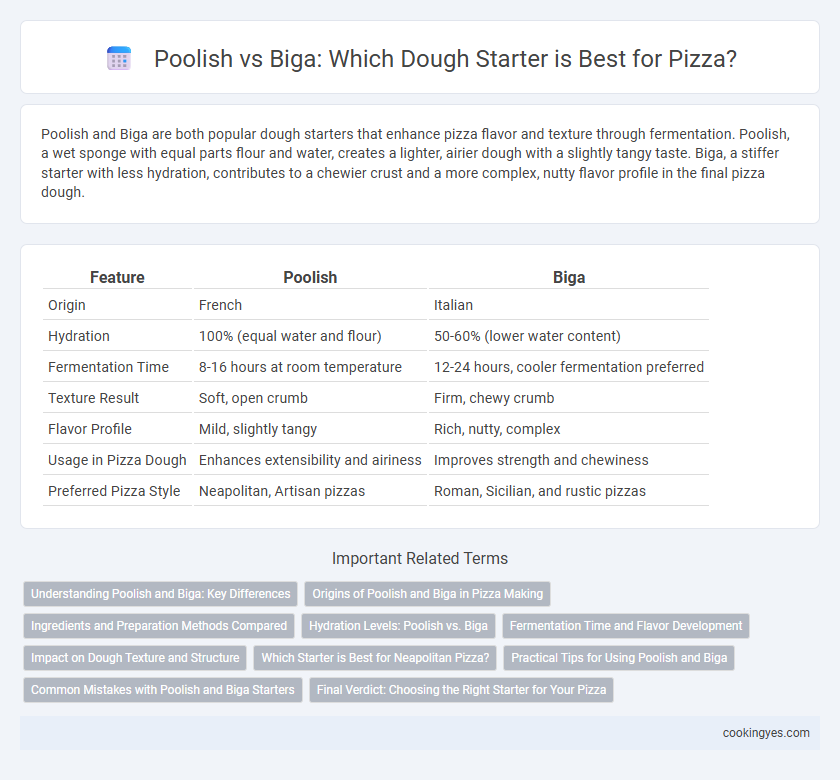Poolish and Biga are both popular dough starters that enhance pizza flavor and texture through fermentation. Poolish, a wet sponge with equal parts flour and water, creates a lighter, airier dough with a slightly tangy taste. Biga, a stiffer starter with less hydration, contributes to a chewier crust and a more complex, nutty flavor profile in the final pizza dough.
Table of Comparison
| Feature | Poolish | Biga |
|---|---|---|
| Origin | French | Italian |
| Hydration | 100% (equal water and flour) | 50-60% (lower water content) |
| Fermentation Time | 8-16 hours at room temperature | 12-24 hours, cooler fermentation preferred |
| Texture Result | Soft, open crumb | Firm, chewy crumb |
| Flavor Profile | Mild, slightly tangy | Rich, nutty, complex |
| Usage in Pizza Dough | Enhances extensibility and airiness | Improves strength and chewiness |
| Preferred Pizza Style | Neapolitan, Artisan pizzas | Roman, Sicilian, and rustic pizzas |
Understanding Poolish and Biga: Key Differences
Poolish, a wet and loose preferment with equal parts flour and water by weight, creates a highly extensible dough ideal for airy, open crumb pizza crusts. Biga, an Italian preferment with lower hydration--around 50-60% water--yields a drier, firmer starter that contributes to a more structured dough and enhanced flavor complexity. Understanding the hydration levels and fermentation times of Poolish and Biga helps pizza makers select the right starter to influence dough elasticity, texture, and taste profiles.
Origins of Poolish and Biga in Pizza Making
Poolish originated in France as a wet sponge pre-ferment, providing Italian pizza dough with enhanced hydration and aroma. Biga, an Italian dry pre-ferment, boasts a longer fermentation time, contributing to a chewier texture and complex flavor in traditional Neapolitan pizza crusts. Both starters are pivotal in authentic pizza making, influencing the dough's extensibility, crust crispiness, and overall taste profile.
Ingredients and Preparation Methods Compared
Poolish and biga are popular pre-ferments used to enhance pizza dough flavor and texture, differing primarily in hydration and preparation time. Poolish features equal parts flour and water, resulting in a wet, batter-like consistency, while biga contains less water, creating a stiff, dough-like starter. Poolish typically ferments for 12-16 hours at room temperature, promoting a mild tang and open crumb, whereas biga ferments for 8-12 hours, contributing a nuttier flavor and denser structure to the pizza crust.
Hydration Levels: Poolish vs. Biga
Poolish typically has a hydration level of 100%, meaning equal parts water and flour by weight, creating a batter-like consistency that enhances dough extensibility and fermentation speed. Biga, with a lower hydration level around 50-60%, forms a firmer, stiff starter that promotes a more robust gluten structure and a chewier crust. The choice between poolish and biga hydration significantly influences dough texture, fermentation timing, and the final pizza crust quality.
Fermentation Time and Flavor Development
Poolish, a wet, sponge-like dough starter, ferments relatively quickly, typically within 12 to 16 hours, enhancing dough extensibility and producing a mild, slightly tangy flavor ideal for airy pizza crusts. Biga, an Italian dry starter with a firmer consistency, requires a longer fermentation period of 18 to 24 hours or more, resulting in a more complex, nutty flavor and improved dough structure that yields a chewier texture. Both starters influence yeast activity and acidity, but Poolish emphasizes speed and subtle taste, while Biga develops deeper flavor profiles and enhanced fermentation time control in pizza dough.
Impact on Dough Texture and Structure
Poolish creates a wetter, more extensible dough with an open crumb structure, enhancing lightness and pliability in pizza crusts. Biga yields a stiffer dough that contributes to a chewier texture and a tighter crumb, ideal for a more robust and structured bite. The choice between poolish and biga significantly influences dough hydration levels, gas retention, and gluten development, directly affecting crust elasticity and mouthfeel.
Which Starter is Best for Neapolitan Pizza?
Poolish provides a wetter, more extensible dough ideal for the soft, airy crumb of Neapolitan pizza, offering a lighter texture and enhanced fermentation flavor. Biga, meanwhile, creates a stiffer dough with a more pronounced tang and a chewier crust, appealing to those who prefer a slightly drier bite. For traditional Neapolitan pizza, poolish is often preferred due to its superior hydration and ability to develop the dough's characteristic tenderness and open crumb structure.
Practical Tips for Using Poolish and Biga
Poolish and biga are both preferments used to enhance pizza dough flavor and texture, with poolish being a wetter, sponge-like starter and biga a stiffer, firmer dough. For poolish, maintain a hydration level around 100%, and ferment it at room temperature for 12 to 16 hours to develop a mild tangy flavor and open crumb. Biga requires lower hydration, about 50-60%, and a shorter fermentation time of 8 to 12 hours for a nuttier taste and chewier crust, making it ideal for Neapolitan-style pizzas.
Common Mistakes with Poolish and Biga Starters
Common mistakes with Poolish and Biga starters include using inconsistent hydration levels, which can affect dough texture and fermentation times. Failing to maintain proper fermentation temperature often leads to underdeveloped flavors or overproofing, compromising the dough's rise and crumb structure. Neglecting to adjust the main dough's salt content when using these pre-ferments can also hinder gluten development and overall dough strength.
Final Verdict: Choosing the Right Starter for Your Pizza
Poolish offers a wetter dough starter with a shorter fermentation time, producing a light, airy crust with mild tanginess ideal for Neapolitan-style pizzas. Biga provides a stiffer starter that ferments longer, resulting in a chewier texture and complex, nutty flavor perfect for Roman-style pizzas. Selecting between Poolish and Biga depends on desired crust characteristics and fermentation time, making Poolish best for soft, delicate crusts and Biga preferable for robust, flavorful doughs.
Poolish vs Biga for dough starter Infographic

 cookingyes.com
cookingyes.com